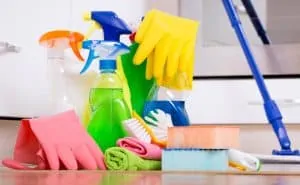Since the onset of Covid-19, many have become hypervigilant in cleaning to ensure the safety of their loved ones. However, we must not forget that household cleaning products are still dangerous chemicals. The CDC has reported over 45,000 overexposures related to cleaning products and disinfectants since Coronavirus began.
That is a 20% increase in just a few short months. We are here to help bring those numbers down. We have put together 5 tips to help keep you safe while you are cleaning.
Let’s get started.
1. Know Your Chemicals
In general cleaning products belong to either the acid or base category. They are on opposite ends of the pH scale and should NEVER be mixed. Identifying which household cleaners belong in which category may help save you from injury or death.
Here is a breakdown of products in their respective categories:
Acids
- Vinegar
- Toilet bowl cleaner
- Rust remover
- Mold remover
- Tile cleaner
Bases
- Bleach
- Glass cleaner
- All-purpose cleaner
- Baking soda
- Oven cleaner
- Detergent
- Ammonia
These are the most common household cleaners of which you should be aware. Mixing these chemicals could cause severe hazards.
2. Be Mindful of Bleach
Bleach is an incredibly effective cleaner and disinfectant. Recently, bleach related poisoning has increased by 77%! Let’s look at what could happen if you are not careful with bleach or bleach-containing products.
Chloroform – When you mix rubbing alcohol and bleach together a dangerous reaction occurs resulting in the production of chloroform. This harmful reaction causes dizziness, fainting, respiratory issues, and can damage your organs.
Chlorine Gas – Vinegar might seem like the perfect natural cleaner, however, when mixed with bleach it becomes a potentially deadly substance called chlorine gas. The gas will cause respiratory issues and could be fatal.
Chloramine – If you mix ammonia with bleach chloramine is made. This harmful mixture causes damage to the lungs, eyes, and can cause severe skin burns.
3. Ventilate
One of the simplest steps you can take during household cleaning is to make sure the area is properly ventilated. Even minor exposure to chemicals can leave you feeling lightheaded or irritate the eyes, nose, and throat.
4. Properly Store Chemicals
When storing hazardous materials such as bleach and ammonia, always keep them out of the reach of children. Make sure that all lids are tightly shut to avoid accidental spills when handling the bottles.
If you are diluting chemicals in spray bottles or buckets ALWAYS label the mix to avoid confusion about the contents.
5. Wear Protective Clothing
Even the mildest of dilutions can irritate the skin and eyes. Because you are likely going to be using disinfectants and cleaners more frequently in these times it is wise to make protective clothing a part of your cleaning routine.
Wear long gloves to prevent chemical burns or irritation to the hands and forearms. To prevent any chemicals splashing into your eyes consider wearing protective eyewear while cleaning. Long pants and shirts can be worn to help protect your skin from overexposure to chemicals.
Being Safe With Household Cleaning Products
Fighting Covid-19 the right way means never misusing cleaners and disinfectants. Safety should always come first when dealing with chemicals. With these tips, using your household cleaning products will be a breeze.
If you would like to learn more about managing your safety with hazardous materials click here!


